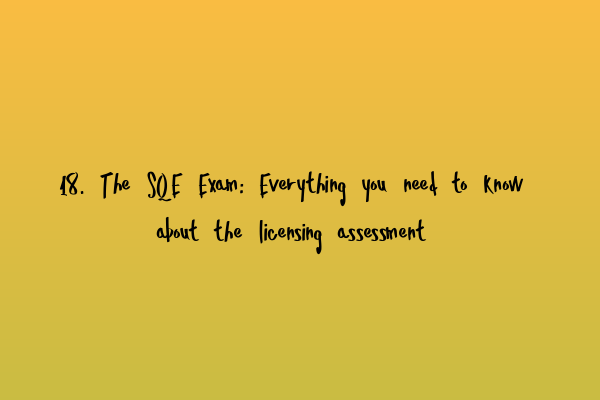18. The SQE Exam: Everything you need to know about the licensing assessment
If you’re considering a career in law, passing the Solicitors Qualifying Exam (SQE) is an essential step towards obtaining your practicing license. The SQE is a new qualification introduced in November 2021 and is designed to assess the necessary skills and knowledge required to become a solicitor in England and Wales.
Whether you’re a law student or a qualified lawyer from another jurisdiction, it’s crucial to understand the ins and outs of the SQE. In this article, we’ll provide you with everything you need to know about the licensing assessment, from its structure to tips for exam success.
1. What is the SQE?
The SQE, or Solicitors Qualifying Exam, is the new licensing examination for solicitors in England and Wales. It replaces the previous qualification route, which included the Legal Practice Course (LPC) and a period of training (training contract).
The SQE aims to ensure that all candidates possess the necessary knowledge and skills required to practice law effectively. It is a comprehensive assessment that evaluates candidates across various areas of legal practice, including practical legal knowledge, legal research and writing, legal drafting, and professional obligations.
2. How is the SQE structured?
The SQE is divided into two stages: SQE1 and SQE2. Each stage assesses different aspects of legal practice, and candidates must pass both to qualify as solicitors.
SQE1:
SQE1 focuses on testing candidates on their functioning legal knowledge. It consists of two parts:
The MCQ section assesses candidates on their understanding of legal principles and their ability to apply them to practical scenarios. It includes topics such as contract law, tort law, criminal law, property law, and more. Adequate preparation and practice are essential for success in this section.
The written skills section assesses candidates’ ability to communicate effectively in a legal context. It includes client letters, advocacy, legal research, and legal writing. Developing strong writing skills and understanding legal conventions is crucial for performing well in this section.
SQE2:
SQE2 focuses on testing candidates’ practical legal skills. It includes:
- Client interviewing and fact-finding
- Advocacy and oral presentation
- Legal research and written advice
- Legal drafting
- Case and matter analysis
- Professional conduct and regulation
SQE2 is designed to assess candidates’ ability to apply legal knowledge in real-world scenarios and simulate the tasks solicitors undertake on a daily basis.
3. Preparing for the SQE Exam
As with any licensing exam, preparation is key to success in the SQE. Here are some tips to help you prepare effectively:
- Familiarize yourself with the SQE assessment objectives and structure.
- Study the relevant legal principles and practice areas thoroughly.
- Practice answering multiple-choice questions and improve your time management skills.
- Develop strong writing skills and familiarize yourself with legal writing conventions.
- Practice your legal research skills and learn how to analyze and apply case law to practical scenarios.
- Participate in SQE Mock Debrief Sessions to identify areas for improvement and develop test-taking strategies.
It is recommended to undertake a comprehensive SQE training program that includes mock exams, study materials, and expert guidance to enhance your chances of success.
4. The Benefits of Passing the SQE Exam
Passing the SQE exam opens up numerous opportunities for individuals aspiring to become solicitors:
- Qualify as a solicitor: Passing the SQE is a necessary step towards obtaining your solicitor practicing license.
- Flexibility: The SQE allows flexibility in terms of study and preparation, allowing candidates to tailor their learning to their needs.
- Cost-effective: The SQE offers a more cost-effective approach to qualification compared to the previous route, which required completing the LPC and a training contract.
- International recognition: The SQE is designed to be internationally recognized, enabling qualified solicitors to practice in various jurisdictions worldwide.
Conclusion
The SQE is a rigorous examination that serves as a gateway to a successful career in law. Understanding its structure, preparing effectively, and seeking expert guidance are crucial steps towards achieving success in the licensing assessment. With the right preparation and dedication, you can confidently tackle the SQE and embark on a rewarding journey as a qualified solicitor.
